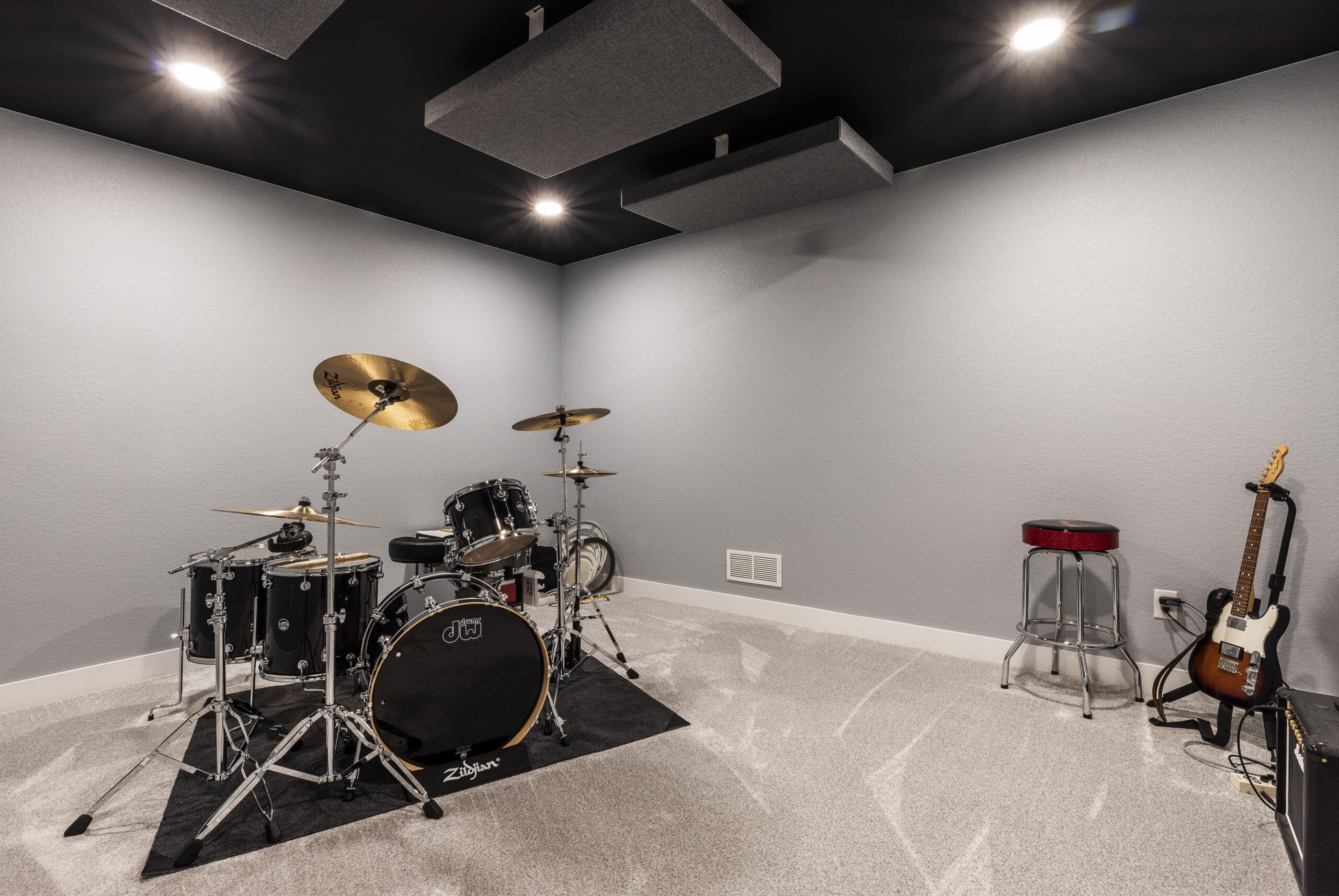Music room with drum set and guitar, featuring sound-dampening panels on the ceiling in a finished basement.
Basements can be really fun hangout spots. You can set up a game room, home theater, or music studio down there. However, one downside of basements is that noise tends to travel really easily between floors.
You might hear thumping footsteps, loud voices, or the TV from upstairs. And any sounds you make in the basement, like jamming on the drums or blasting music, can disturb people above you. No one wants to be that noisy neighbor! The good news is that you can mitigate sound in your basement to reduce noise transfer in both directions.
Disclaimer: While these methods can significantly reduce noise, there is no guarantee to completely soundproof a basement.
Read on to learn some easy steps for creating a quiet, peaceful basement retreat.
Add Mass-Loaded Vinyl
Mass-loaded vinyl is a flexible, heavy sound-dampening material made of vinyl sheets with added mass. This extra mass blocks airborne noise transfer through walls and ceilings when installed properly. Look for a product with a high STC (Sound Transmission Class) rating of 25 or higher.
Use Acoustic Panels
Acoustic foam panels absorb sound waves inside a room, so noise doesn’t reflect back. These soft panels are usually mounted directly on walls or ceilings. The thicker and denser the panel material, the better it mitigates sound.
Look for panels made of open or closed-cell foam with at least 1-inch thickness and high NRC (Noise Reduction Coefficient) ratings. Cover as much of the room’s surface area as possible with acoustic treatment, focusing on parallel wall surfaces to effectively eliminate flutter echoes between them.
Seal Air Leaks
A major cause of noise transfer is air leakage through cracks, gaps, and holes. Seal all openings in basement walls and ceilings with acoustic caulk or spray foam sealant. This stops sound from traveling through cavities. Pay special attention to areas around outlets, ductwork, pipes, windows, and where walls meet floors and ceilings.
Install Sound-Dampening Doors
Regular hollow-core doors do little to block noises. Swap out basement doors for solid wood or sound-dampening doors with extra insulation. Look for well-gasketed, weather-stripped doors, as they block sound transmission. Solid-core wood doors with compression seals can also provide decent sound insulation. Add automatic door sweeps on the bottom to prevent gaps when closed.
Use a Sound-Dampening Ceiling System
For the ultimate noise reduction, install a suspended drywall ceiling system known as a damped gypsum board. Resilient channels isolate the ceiling from structural noise, while batt insulation absorbs sound waves.
Minimize Vibrations
Vibrations from appliances, HVAC systems, or plumbing fixtures can contribute to unwanted noise in your basement. To minimize this, consider installing vibration isolation pads under appliances and soundproofing pipes. Additionally, placing rubber or cork pads under heavy equipment can help absorb vibrations and prevent them from traveling through the structure.
Hush That Noise!
Transform your basement into a peaceful haven effortlessly. Strategically place furniture as a natural sound barrier. After mitigating sounds in your basement, test its effectiveness. Play music in adjacent rooms to check for sound leakage. Adjust your strategy as needed for optimal quietness.
Ready to change your basement into a peaceful getaway? Whether you’re looking to remodel or improve its functionality, count on our team at ElkStone Basements. Don’t let noise disrupt your peace—let us create the perfect space for you in Denver, Colorado Springs, or Fort Collins. Call us at (202) 656-9006 or schedule a consultation online to get started!




Recent Comments